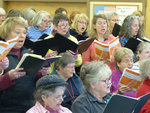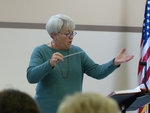For 40 years, the Community Chorus of Port Townsend and East Jefferson County has shared an intimate, inseparable affiliation with George Frideric Handel’s “Messiah.”
The most famous …
This item is available in full to subscribers.
We have recently launched a new and improved website. To continue reading, you will need to either log into your subscriber account, or purchase a new subscription.
If you had an active account on our previous website, then you have an account here. Simply reset your password to regain access to your account.
If you did not have an account on our previous website, but are a current print subscriber, click here to set up your website account.
Otherwise, click here to view your options for subscribing.
* Having trouble? Call our circulation department at 360-385-2900, or email our support.
Please log in to continue |
|



For 40 years, the Community Chorus of Port Townsend and East Jefferson County has shared an intimate, inseparable affiliation with George Frideric Handel’s “Messiah.”
The most famous oratorio by the Baroque composer, with its sweeping sacred story, memorable arias and rousing choruses, was the logical program choice for the fledgling chorus in 1975. In what has become a long-standing tradition, the group has performed the beloved favorite at least every five years since that inaugural concert.
Singers – both those who have sung it many times and those who are new to the piece – call Handel’s work inspired. Listeners who might not be familiar with any other major classical works know and love its melodies and appreciate its meaningful text.
Darlene Grunke, who sang for the first “Messiah” performance in Port Townsend in 1975, said she loves the piece because of its beauty and the story it tells.
“There’s pathos, sheer joy and everything in between” in this piece. “It speaks to your soul.”
No matter an individual’s religious or nonreligious beliefs, “The themes in ‘Messiah’ – birth, joy, praise, scorn, despair, redemption, gratitude – are universal, and the music reflects these basic human experiences,” explained Peggy Albers, a former chorus board president who is singing in the ranks of this year’s chorus.
The 2015 choir, which has swelled to about 110 singers for the 40th-anniversary concerts, performs “Messiah” in two concerts: Sunday, Nov. 29 and Sunday, Dec. 6. Both are at 3 p.m. in the Chimacum High School auditorium. Patrons should arrive no later than 2:40 p.m. to be ensured seating. Advance tickets are available at brownpapertickets.com and a limited number at Crossroads Music in Port Townsend, 385-1471. Tickets at the door are $15. For general concert information, visit ptchorus.org or call 385-1402.
Albers said, to this day, a personal joy for her was singing “For Unto Us a Child Is Born” six weeks after the birth of her son. She said that since then, “even though I have performed ‘Messiah’ numerous times, every season brings new insights and experiences.”
Current chorus board president Pat Hartman said that this is the third time she has performed it with the Community Chorus – “and I still have notes and techniques to learn.
“The music is difficult for seasoned choral performers because of the timing and the runs. Given that we are a community chorus with many inexperienced singers and no auditions, it is even more of a challenge to perform these pieces.”
But the singers rise to the occasion, she said. “The feeling of singing such grand music with more than 100 singers is thrilling and energizing.”
A SPECIAL YEAR
Germaine Arthur, a former board member and longtime chorister, was one of the voices in the start-up collection of singers who, directed by Russell Abbott, first performed “Messiah” in 1975 in Port Townsend. These concerts represent her 10th time performing the piece.
And this year is special because her 16-year-old granddaughter will be standing next to her on the concert risers singing it for the first time. “It’s such a thrill for me,” Arthur said.
The number of singers has grown this season both because the classic oratorio is to be performed and because director Rebecca Rottsolk is retiring from the Community Chorus.
“I honestly am not thinking about it being my last Community Chorus concert,” Rottsolk said. “If this choir were all about me – well, then I’d think about it. But it’s not. It’s all about the singers and the music. And I am not the only conductor.
“Community Chorus singers are always so fresh,” said Rottsolk. “To many of them the music is new, and doing something like this holds so much magic. Case in point is my husband, Tony Costa, who at age 79 is singing ‘Messiah’ for the first time in his life. He is giddy about it and practices every day. That’s a unique kind of excitement.”
Lee Ann Chearneyi and Philip Morley are two more singers new to “Messiah.” Their preparation has involved some intense and diligent study, but the payoff is approaching.
“It’s amazing to take part in making something that’s so well known,” Morley said. “There’s a change in dynamic from being in the audience to now being part of the performance. It’s been an opportunity to make art.”
Singing “Messiah” has been a moving experience for Chearneyi. She only recently returned to singing and said that each season in the chorus she learns something new from Rottsolk and from spring director Leslie Lewis. “Most of all, I’ve earned a vocal confidence and a joy in my voice.”
“Messiah” was commissioned for Dublin, Ireland, and first performed in a secular hall on April 13, 1742. The time was Lent; it was not traditionally performed during the Christmas season as it usually is today.
“I think it’s interesting to note that this piece never had to be revived, because it never disappeared,” Rottsolk said. It is probably the oldest work to remain consistently in the repertory of classical music, she added.
Handel was not a church musician, Rottsolk explains in her program notes. “His sacred oratorios, like the opera of the time, were music for entertainment. He did not write a narrative drama about the birth, life, death and resurrection of Christ, but rather offered a lyric contemplation of the idea of Christian redemption.”
In his day, Handel used a variety of soloists. Following his example, Rottsolk has selected 14 soloists who are members of the choir to sing 27 different arias and recitatives. Some are to perform in ensembles. They are joined by the full choir singing 16 choruses. Working in tandem with singers is a select, 19-piece orchestra. Lisa Lanza has been rehearsal pianist for the group and also performs on harpsichord keyboard as part of the orchestra.
“Messiah” was an 18th-century hit, but its enduring appeal can be attributed to many factors, not the least of which are its memorable melodies, including the “Hallelujah” chorus. Plus, Rottsolk said it’s a pleasure to sing and play, and although it offers plenty of challenge, it’s still “doable.”
“The fact that it’s in English makes it accessible to both choirs and audiences, and the oratorio-style storytelling gives it drama, but doesn’t require sets, costumes, lighting, etc.,” Rottsolk continued. Her take on the classic might be more attuned to Handel’s intention. She urges a light, dance-like approach from singers and orchestra.
CONDUCTING ‘MESSIAH’
Rottsolk conducted “Messiah” both in 2005 and 2010. The 2005 turn at the baton was a first in her conducting career.
“I’m way less scared than the first time I did it, when I began my score study 10 months ahead and spent 20 hours a week just getting it all in my system,” she said. “Now, the flow of it seems much more natural, and I have a much clearer intent on the artistic details I want to accomplish in each movement.”
She said there are hundreds of decisions to be made about every musical subject – everything from the Baroque styling to articulation to dynamics, or when to make a musical line of notes detached or legato (smooth and flowing).
“I love being part of a historical tradition that began over 300 years ago,” said Lanza. “I guess that is why I love playing classical music; it connects me to the past viscerally.”
Throughout her 40 years with the chorus, Arthur has appreciated not only the message of “Messiah,” but, like Lanza, also its history. “It gives us a feeling of connectivity to the ages.”
“Rebecca, who brings her choral directing expertise and leadership to the group, has been remarkable to work with,” Lanza said. “It’s such an easy run with her.”
Arthur concurred: “Rebecca inspires singers to reach for the next level. Rehearsals are hard work, but she makes them fun and rewarding.”
Rottsolk has high praise for the chorus, too.
“If singers weren’t doing a lot of extra study outside our weekly rehearsals, we couldn’t tackle such a large piece and attempt to make it extraordinary,” she said. “They just work hard and bring themselves directly to the experience.”
Hartman said, “It resonates with a small community like ours that we produce such a major work with local performers. And the community has provided very generous support over the years.”
“We’re of the community and singing to the community,” noted Morley.
“Performing this great work with a stage full of people that I know to some degree or another is so thrilling,” said Lanza. “I love the Community Chorus for that reason, that we create something together with everyone contributing and then we share it with the rest of the community.”